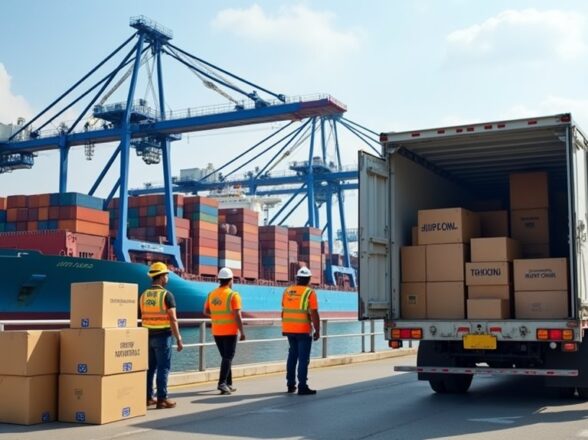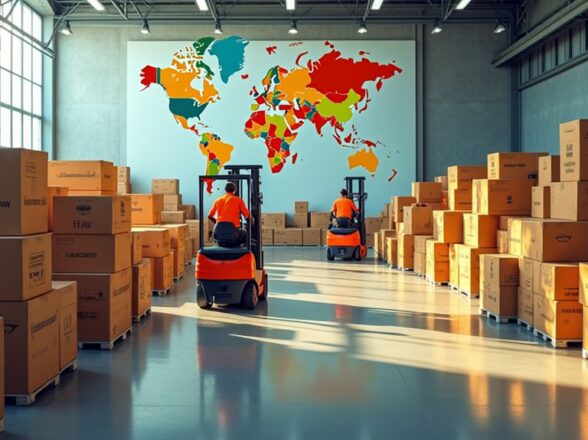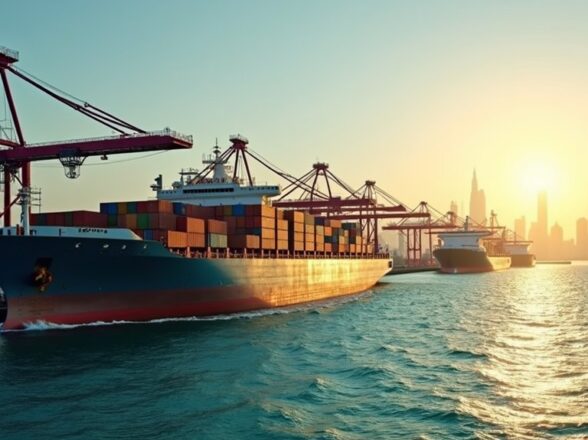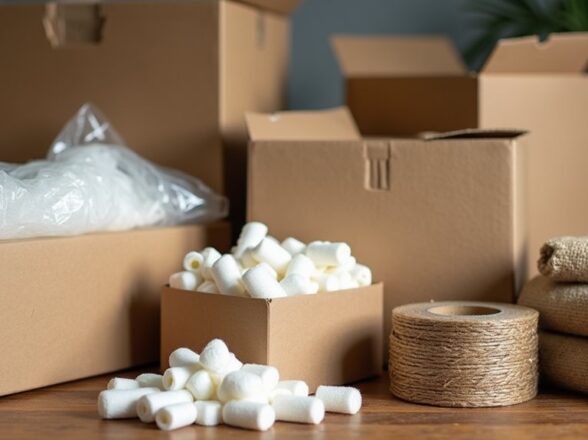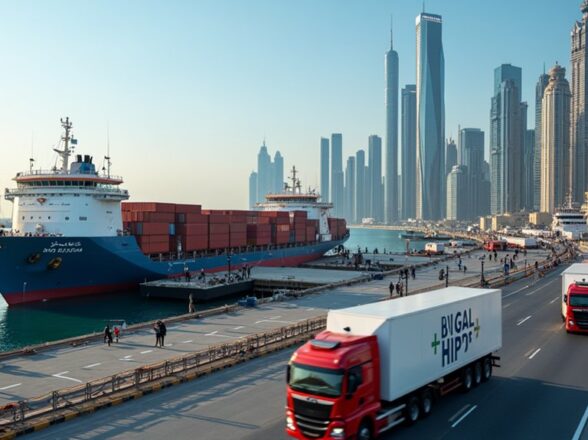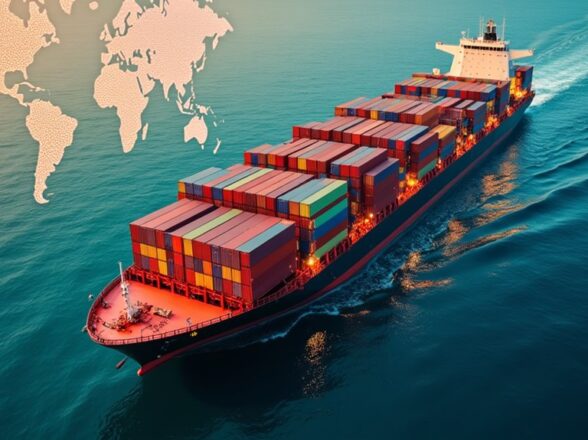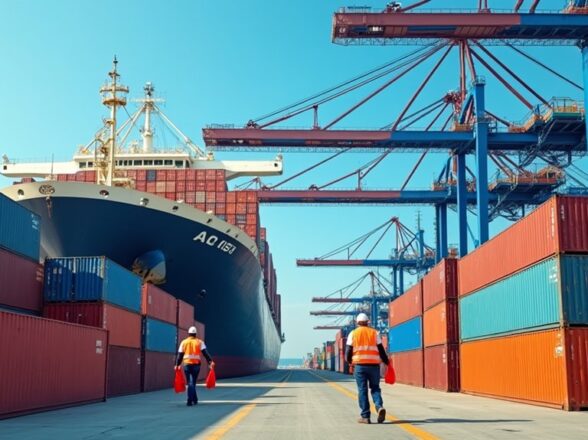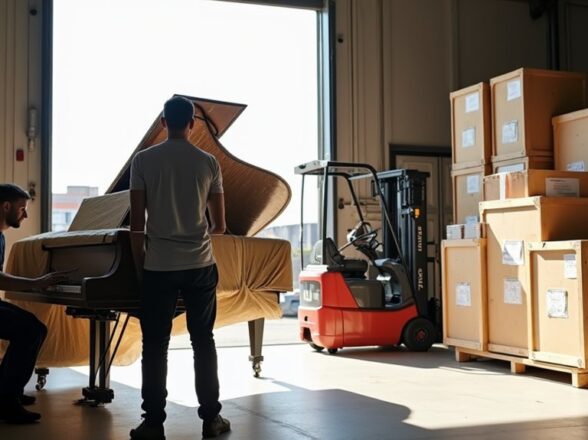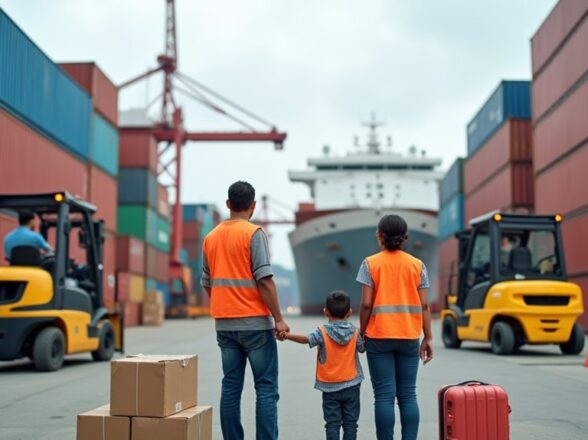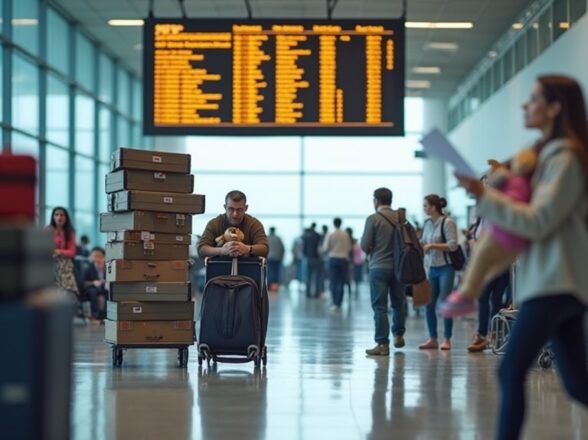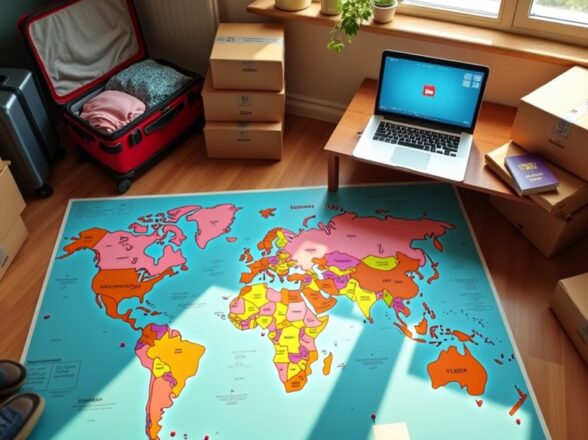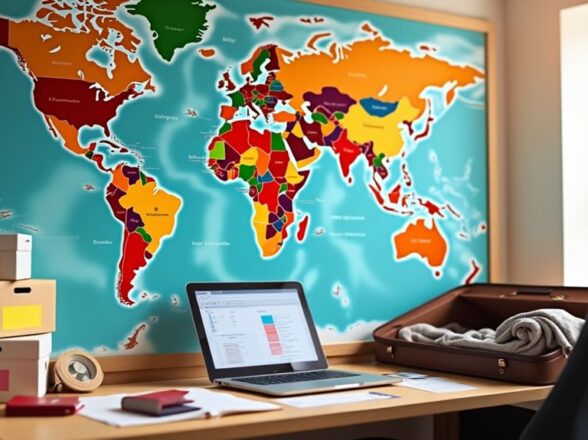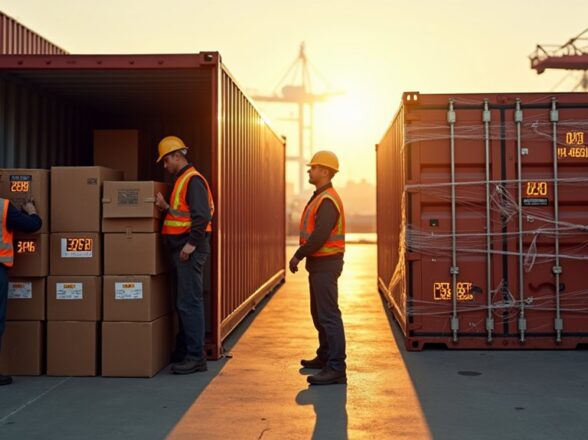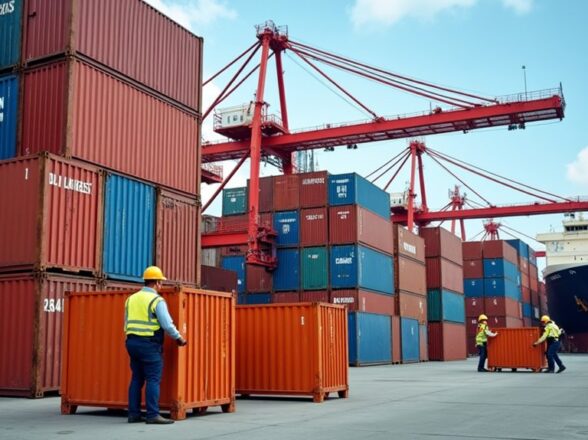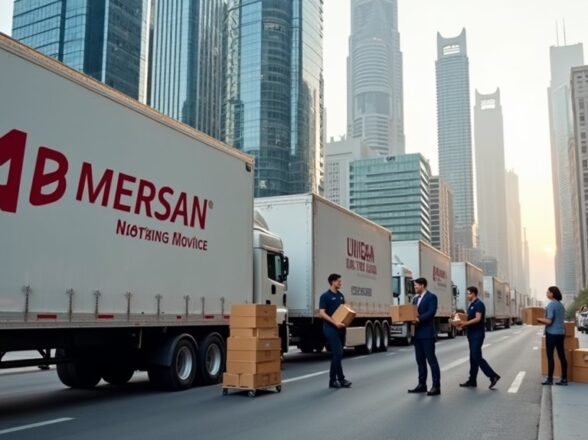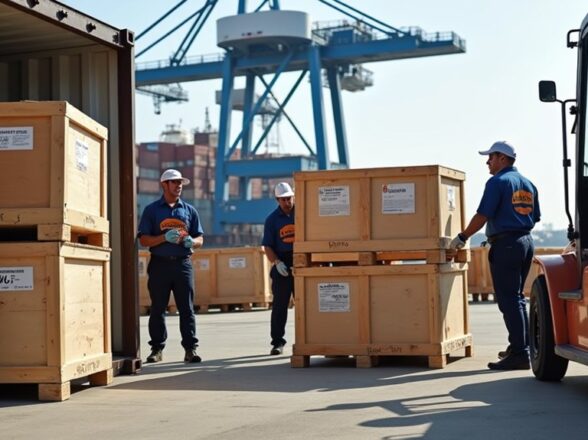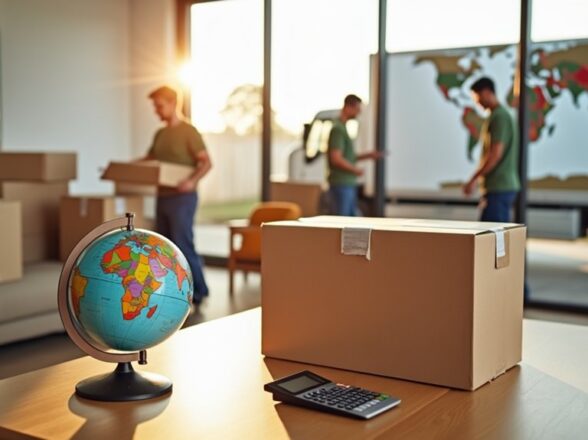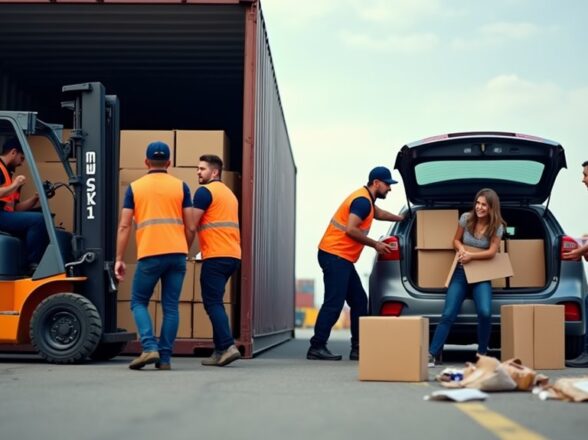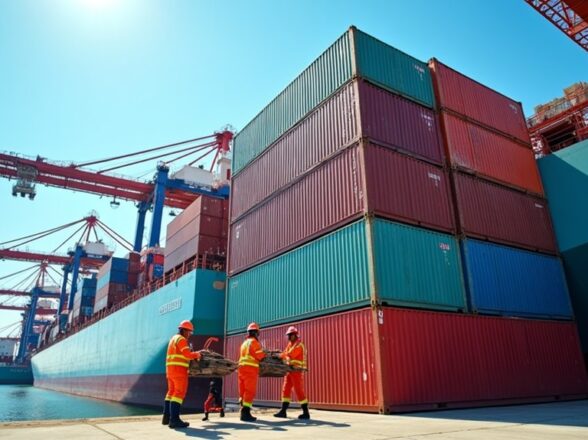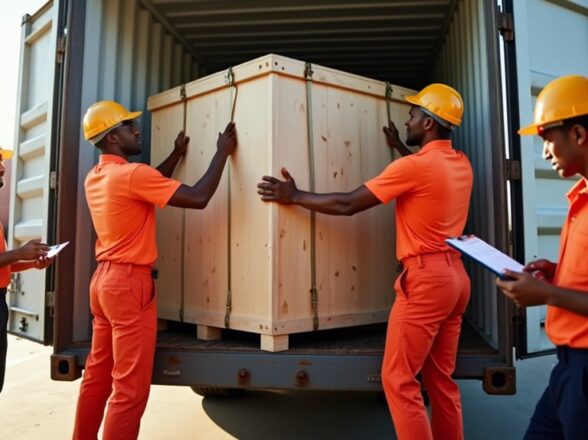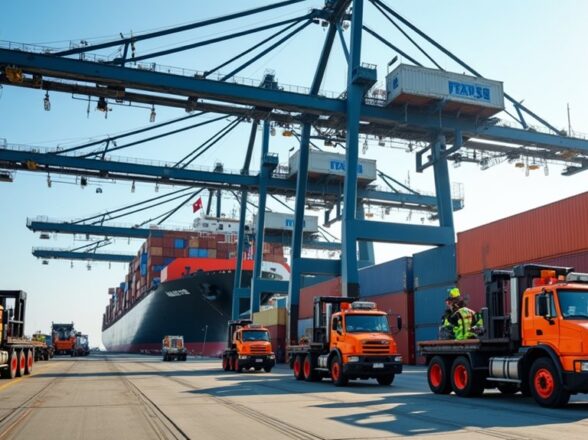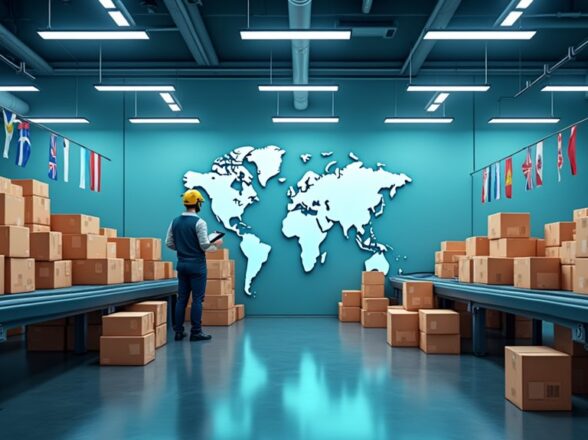What Questions Should I Ask Before Hiring an International Mover?
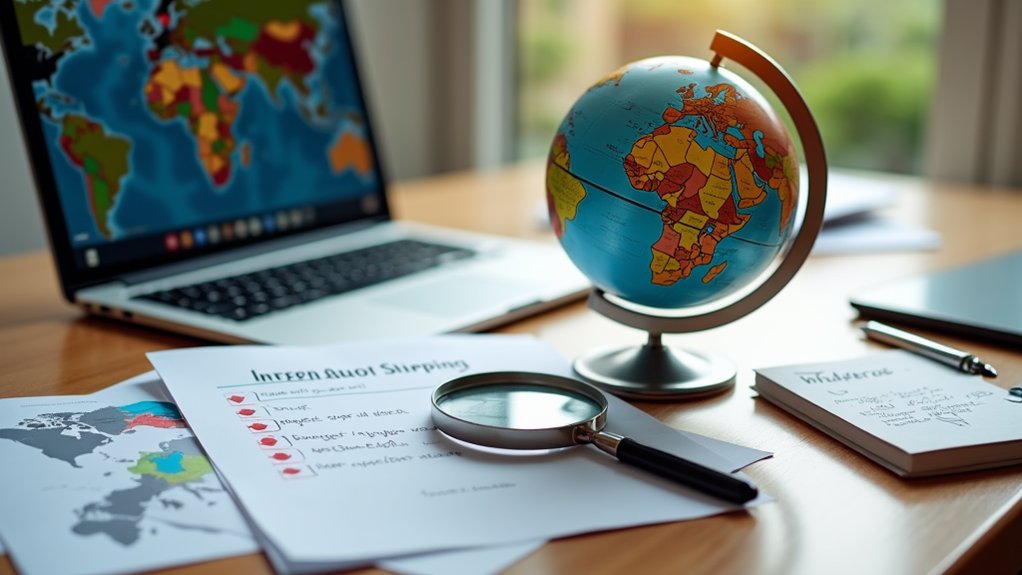
Before hiring an international mover, you should ask about their experience and credentials. Check how long they've been in business and verify their licensing and insurance. Request detailed quotes that include breakdowns of costs along with payment terms. Inquire about the services offered, including packing and customs support. Understand their insurance options and claims process for potential damages. Ask about shipping methods, estimated transit times, and communication protocols during the move. Finally, confirm how they handle additional fees and delivery timelines. These questions will help guarantee a smoother relocation process and clarify what to expect.
Key Takeaways
- Verify the mover's experience, licensing, and insurance to ensure reliability and legal compliance in international relocations.
- Request detailed quotes and clarify payment terms, including potential hidden charges and cancellation policies.
- Inquire about their services, including packing, customs support, and familiarity with destination country regulations.
- Understand the insurance coverage options available and the claims process for any potential damage during the move.
- Ask about shipping methods, tracking options, and communication protocols for updates during transit.
Company Experience and Credentials

When considering an international mover, how can you guarantee they have the right experience and credentials? Start by looking at the company's operational history. Ideally, you want a mover with at least five years of experience in international relocations. This experience indicates reliability and expertise in handling the complexities of moving across borders.
Next, check their licensing and insurance coverage. Confirm the mover has the necessary permits for cross-border operations. This licensing is essential for legal compliance. Additionally, sufficient insurance coverage protects your belongings during the move. Without proper insurance, you risk losing valuable items without any recourse.
It's also important to assess the company's specialization in international services. Ask about their experience with specific destination countries and their knowledge of customs regulations. This expertise can greatly ease the moving process and help avoid delays.
Don't forget to research customer reviews and testimonials. Platforms like Google and Trustpilot provide insights into past clients' experiences. Look for patterns in feedback to gauge overall satisfaction levels and identify any recurring issues. Upsleeve's positive feedback from clients highlights their service quality and efficiency, making it a reliable choice for international moves.
Finally, inquire if the company is a member of professional organizations like FIDI or IAM. Membership in these groups indicates a commitment to industry standards and best practices, which can give you added confidence in their services. By taking these steps, you can better confirm that your chosen international mover has the right experience and credentials to manage your relocation successfully.
Cost Estimates and Pricing Structure
After confirming a mover's experience and credentials, the next important step is understanding their cost estimates and pricing structure. To guarantee you're making an informed decision, start by obtaining detailed quotes from multiple international movers. Each estimate should include a thorough breakdown of costs, covering transportation, packing, insurance, and customs fees. Understanding how the moving company calculates its estimates is essential. Typically, this is based on the weight or volume of your belongings and the distance to your destination. Additionally, consider if additional services like packing, storage, and insurance are included in the quote, as these can increase overall costs. It's also important to inquire about any additional charges that may arise during the move. These can include:
- Port fees
- Customs duties
- Fuel surcharges
Being aware of these potential costs can help you avoid unexpected expenses down the line.
Additionally, clarify the payment terms required by the mover. Ask about any deposit requirements and which payment methods they accept. This promotes financial transparency and helps you plan your budget efficiently.
Lastly, compare the estimates you receive against industry averages. This comparison can help you evaluate the cost-effectiveness of the services offered and make a more informed choice. By focusing on these factors, you can better understand the pricing structure of your potential movers and choose a service that fits your budget and needs.
Services Offered
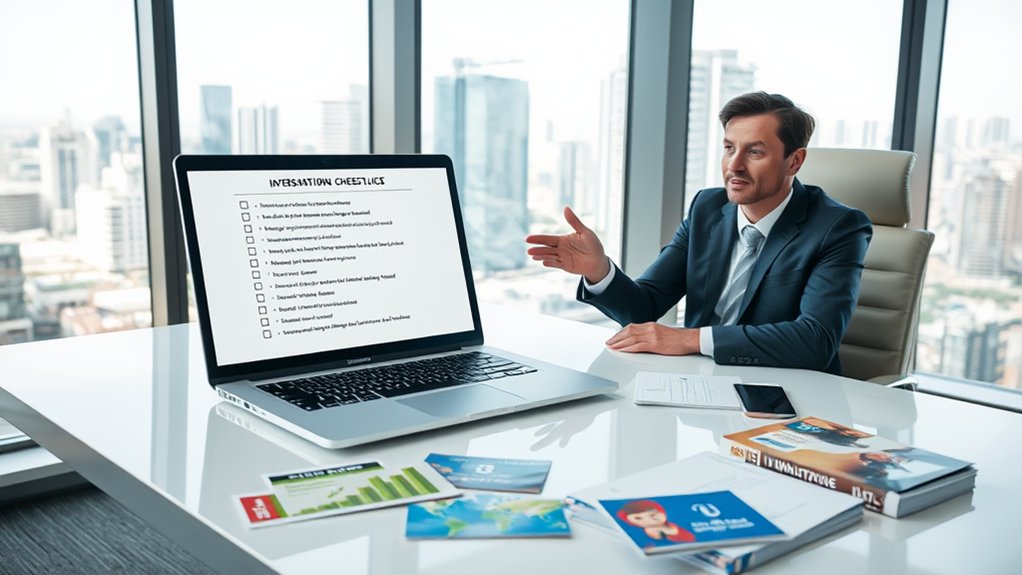
What services can you expect from an international mover? First, inquire about the range of services offered. Many movers provide packing and unpacking services, which can save you time and effort. Additionally, check if they offer storage solutions for any items you might not need immediately. Some movers even specialize in services like vehicle transport or pet relocation.
Customs clearance is another important aspect to contemplate. Confirm whether the mover provides assistance with customs clearance and the necessary paperwork. This support can help guarantee a smooth shift across borders.
You should also ask about door-to-door service. This option allows for seamless logistics management from your current location to your new home. It minimizes the risk of additional handling, making your move more straightforward.
When discussing costs, don't forget to clarify whether unpacking services are included in the overall price. Assistance with setting up at your new location can also be beneficial.
Lastly, tracking options are essential during transit. Ask if the mover offers tracking services to keep you informed about the status of your belongings. Knowing where your items are can provide peace of mind throughout the moving process. Choosing a mover with expertise in international moves ensures that you have a team familiar with the complexities and requirements involved in international relocations.
Packing Policies and Procedures
Packing policies and procedures play an important role in ensuring your belongings arrive safely at your new home. When hiring an international mover, it's vital to ask about their packing services and the materials they use. Understanding how your items will be packed can greatly impact their protection during transit.
Here are some important questions to reflect on:
- What packing materials do you use to protect my belongings?
- Who is responsible for packing fragile items, and do you have special techniques for high-value goods?
- What's the packing timeline, and are there deadlines I need to meet?
Additionally, it is crucial to inquire about the expert packing and handling procedures that the moving company employs to ensure the safety of your items. You should also confirm that the estimator providing your quote is an employee of the moving company. This can influence the accuracy of the estimate you receive. Once you have this information, request a detailed breakdown of estimated costs related to packing services. This should include labor, materials, and any additional fees that may apply.
Shipping Services and Transit Times
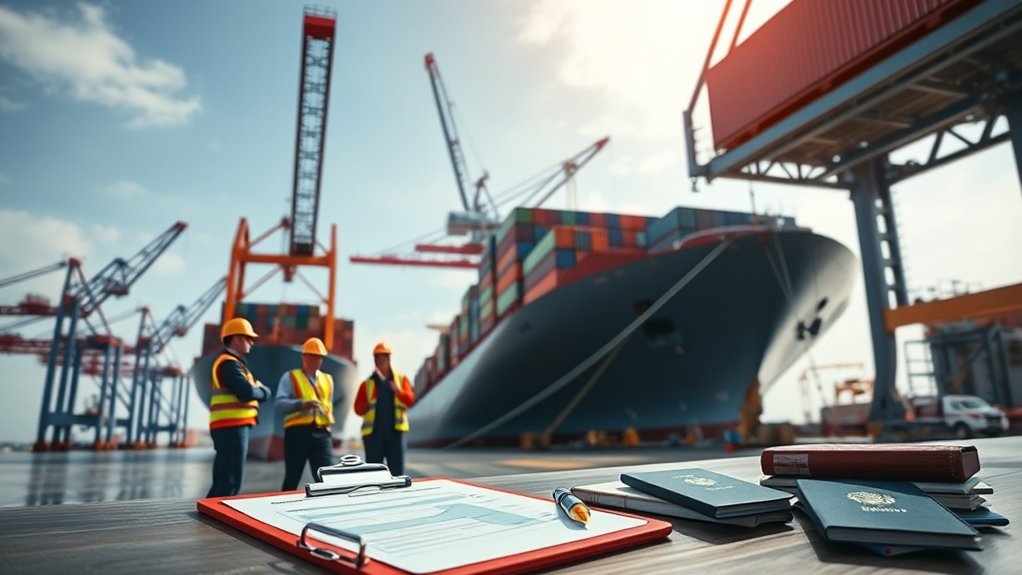
When planning an international move, how do you choose the right shipping method for your needs? Start by inquiring about the specific shipping services offered. You can typically choose between air freight and sea freight. Air freight is faster but usually more expensive, while sea freight is more budget-friendly but takes longer. Consider your budget and how quickly you need your belongings to arrive.
Next, request estimated shipping times for your move. Shipping times can vary considerably, ranging from one to six weeks, depending on your destination and the shipping method you select. Understanding these timelines helps you plan better and manage expectations.
It's also important to understand potential risks associated with transshipment. If your goods need to be transferred between vessels, it may increase the chances of delays or damage. Knowing this can help you make informed decisions about your shipping options.
Confirm the communication protocols in place during transit. Ask how often you'll receive updates and what methods are available for tracking your shipment. This transparency can ease your mind while you wait for your items to arrive.
Lastly, ask about contingency plans for potential delays, such as customs clearance issues or unexpected shipping disruptions. Companies like Upsleeve Freight Forwarding offer tailored solutions that ensure efficient and reliable logistics services. Understanding how the mover addresses these situations will give you confidence in their service. By asking these questions, you can choose a shipping method that meets your needs while ensuring a smoother change to your new home.
Customs Regulations and Brokering Services
When planning your international move, it's essential to understand the specific customs documentation needed for your destination country. Each nation has its own regulations, so make sure to ask about any restrictions on items like food or personal effects. Also, check if the moving company provides customs brokering services to help you navigate these requirements efficiently.
Required Customs Documentation
What documents do you need for a smooth international move? Understanding the required customs documentation is essential in order to avoid delays and fines. Each country has unique customs requirements that you must follow. Make sure your mover assists you with the necessary paperwork, such as customs declarations and import permits.
Here are some key documents to take into account:
- Customs declarations: These detail the items you're moving and their value.
- Import permits: Some countries require specific permits for certain goods.
- Inventory list: A detailed list of your belongings can help streamline the process.
It's also important to check for any restrictions on items like food, plants, or hazardous materials. These can complicate your move if not addressed. Confirm if the moving company provides customs brokering services as this can simplify the process. Evaluate the broker's experience with regulations specific to your destination country. Finally, be aware of potential duties and taxes that might apply when your belongings arrive, as these can affect your overall moving costs. Being prepared with the right customs documentation will make your international move more efficient.
Customs Clearance Support Options
How can you guarantee a smooth customs clearance process during your international move? First, ask if the moving company offers customs brokering services. These services can help you with the necessary documentation and compliance with import and export regulations in your destination country. Understanding the specific customs documentation required for your move is essential. This may include import permits, customs declarations, and proof of ownership for certain items.
Next, check the company's familiarity with customs regulations in your destination country. This knowledge is critical for maneuvering potential restrictions or duties that may apply to your shipment. It's also important to confirm if the mover provides guidance on duties and taxes. These costs can greatly affect your overall relocation expenses.
Additionally, inquire whether the moving company uses electronic customs clearance systems to expedite the process and minimize delays. Finally, guarantee the company has a clear process for managing customs clearance. Ask how they handle any issues that may arise during this stage. Having a reliable plan can make the customs clearance process much easier for you. By addressing these points, you can help guarantee your international move goes as smoothly as possible.
Presence for Customs Clearance
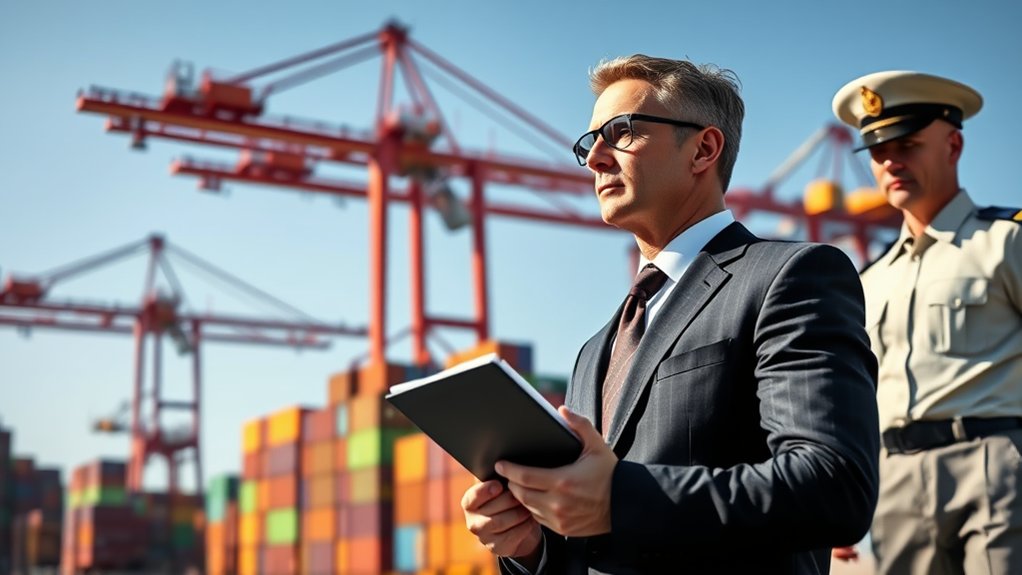
Are you prepared for the customs clearance process? Understanding whether your presence is necessary during customs clearance can save you time and reduce stress. Some countries require the owner's presence to complete the process efficiently. Consequently, it's important to confirm this requirement with your mover.
Here are some key points to reflect on:
- Know the customs regulations: Each country has different requirements for documentation and procedures.
- Inquire about customs brokering services: These services can help facilitate the clearance process and may allow you to avoid being present.
- Ask about associated fees: Understanding the costs related to customs clearance can impact your overall moving budget.
Consider creating a moving budget that includes potential costs associated with customs clearance, such as additional documentation fees or hiring customs brokering services.
It's vital to understand the specific customs regulations of your destination country. Requirements can vary greatly, and some may require you to submit documents in person. If you can't be present, ask about potential delays. These delays can greatly extend your delivery timeline.
Additionally, check if the moving company offers customs brokering services. This can simplify the process, making it smoother for you. However, clarify any associated fees for these customs clearance services. Knowing these costs in advance will help you plan your budget better.
Storage Options and Solutions
After addressing the customs clearance requirements, it's important to contemplate your storage options during an international move. Start by inquiring about both short-term and long-term storage solutions. This can be essential if there are delays, giving you flexibility when managing your belongings. Next, confirm the safety and security measures in place for stored goods. Ask about surveillance systems, climate control, and fire protection. Ensuring your items are secure during storage is a priority. Understanding the costs associated with storage services is also significant. Inquire about any fees related to access, duration, and whether costs may increase over time. This will help you budget effectively for your move. Additionally, check on the flexibility of the storage duration. You should know how long you can keep your items in storage and what the process is for retrieving them if needed. This information can save you time and stress later on. Lastly, verify if the moving company offers insurance options for goods stored in their facilities. This is imperative for protecting your items against potential damage or loss. Knowing your belongings are insured can provide peace of mind during this shift. Taking the time to ask these questions about storage options can help you make informed decisions as you navigate your international move. Consider using secure business storage facilities that offer climate-controlled units and advanced security measures to protect sensitive business assets during your international move.
Insurance Coverage and Policies
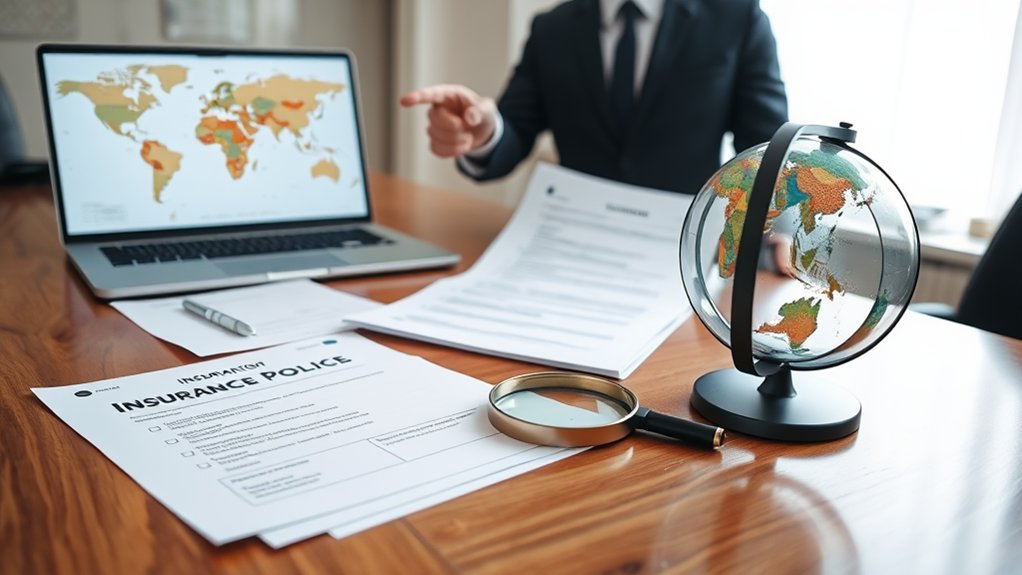
What level of protection do you need for your belongings during an international move? Understanding insurance coverage is fundamental in ensuring your items are safe throughout the process. You should inquire about the different types of coverage options available, such as basic liability coverage and extensive insurance. Basic liability coverage typically offers around $0.30 per pound, which may not fully protect your high-value items. In contrast, extensive insurance covers belongings at their current market value, providing better protection.
Here are some key aspects to reflect on when discussing insurance with your mover:
- Coverage Limits: Confirm the maximum amount the insurance will cover, as well as any exclusions that might apply.
- Claims Process: Ask about the steps required for filing a claim if your items are damaged. Understand the documentation needed and the average response time for resolution.
- Additional Insurance Options: If you have high-value items, evaluate whether the mover offers third-party insurance for extra peace of mind.
It's important to review the differences between basic and extensive coverage. Basic coverage may leave gaps in protection for valuable items. By understanding your mover's insurance policies and the claims process, you can make informed decisions that will help safeguard your belongings during the move. Remember, securing the right insurance is vital for a smooth and worry-free international moving experience.
Customer Support and Communication
When hiring an international mover, customer support and communication are essential. Make sure the company assigns a dedicated move coordinator who can guide you through the process and provide regular updates. It's also important to ask about their communication methods and how quickly they respond to inquiries, so you know you'll stay informed every step of the way.
Dedicated Move Coordinator
How can having a dedicated move coordinator transform your international relocation experience? A dedicated move coordinator acts as your single point of contact throughout the moving process. This simplifies communication and offers personalized support tailored to your needs.
Here are some ways a dedicated move coordinator can enhance your experience:
- Streamlined Logistics: They manage all logistics, scheduling timelines, and coordinating with various parties, so you don't have to juggle multiple contacts.
- Expert Guidance: With specialized training in international moving procedures and customs regulations, they guarantee you understand every step of the process.
- Prompt Issue Resolution: If any concerns arise, your coordinator addresses them quickly. This proactive approach helps prevent delays and guarantees a smoother move.
Having a dedicated move coordinator improves your overall customer experience. They tailor services to fit your individual preferences, making the relocation less stressful and more efficient. With their support, you can focus on settling into your new home instead of worrying about the complexities of your move. Choosing a mover that offers this service can make a significant difference in how you navigate the challenges of international relocation.
Regular Update Frequency
Keeping track of your international move can be overwhelming, so regular updates from your mover are essential. You should expect updates that include shipment status, estimated delivery schedules, and any potential delays. This information keeps you informed and helps you plan accordingly.
Ask about the communication protocols your mover has in place. Reliable movers should offer scheduled check-ins via phone or email, providing timely updates during transit. It's best to inquire about the frequency of these updates. Ideally, you should receive daily or weekly communications, especially during critical phases of your move.
Effective customer support means that any issues are communicated to you promptly. Confirm your mover is prepared to notify you of changes or necessary actions as they occur. A dedicated move coordinator can greatly enhance this process. They serve as your single point of contact, confirming that all your questions are answered and that you receive regular updates.
Proactive Communication Strategies
Effective communication is essential for a smooth international move, so it's important to guarantee your mover has proactive strategies in place. Start by asking if they assign a dedicated move coordinator as your single point of contact. This person will streamline communication and keep you informed throughout the process.
You should also inquire about the frequency and methods of communication. Regular updates via email or phone calls can help you stay updated on your belongings' status. Confirm their response times for inquiries and issues, as prompt communication can improve your overall experience.
Consider the following proactive communication strategies:
- Notifying you of potential delays during transit to keep you prepared.
- Providing multiple channels for customer support, like phone, email, or live chat, for urgent concerns.
- Offering clear timelines for when you can expect updates or responses.
These proactive measures can greatly enhance your moving experience. When you guarantee effective communication and responsive customer support, you'll feel more confident throughout your move.
References and Reviews
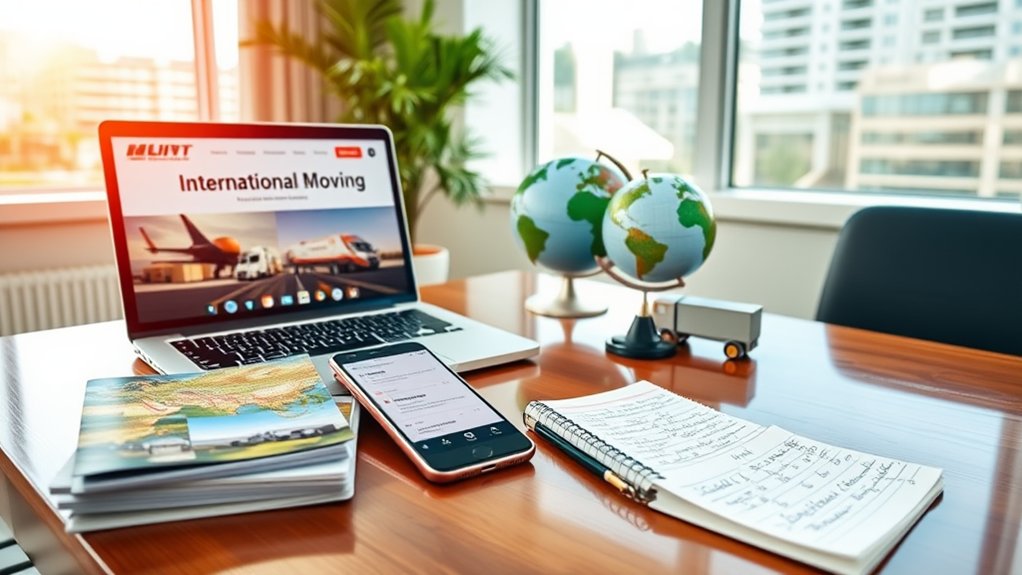
When searching for the right international mover, what better way to assess their reliability than by diving into references and reviews? Start by checking online platforms like Google, Trustpilot, or Yelp. These sites provide customer reviews and ratings that can help you gauge overall satisfaction and service quality. A collection of positive reviews often reflects a mover's strong reputation in the industry.
Next, visit the mover's website. Look for testimonials that highlight specific experiences with international relocations. These testimonials can give you insight into their expertise and how well they manage complex moves. Don't hesitate to ask the mover directly for references from previous clients who have completed similar international moves. Speaking with past clients can provide you with firsthand accounts of their experiences.
Additionally, research the company's reputation in industry forums or social media groups focused on moving and relocation. These platforms often contain candid opinions and insights from clients who have used the movers' services. Pay attention to how the company responds to negative feedback or complaints in reviews. This can give you a clear indication of their customer service commitment and how they handle issues that arise.
Ultimately, thorough research on references and reviews is essential. They offer a clearer picture of what you can expect from the mover and help guarantee your international relocation goes smoothly.
Handling Fragile Items
When you're moving internationally, handling fragile items requires careful planning. Start by asking about the mover's packing techniques, including the cushioning materials they use. It's also important to confirm their insurance options in case anything gets damaged during transportation.
Packing Techniques for Fragiles
Packing fragile items requires careful attention to detail to ascertain they arrive at your new home intact. Start by using high-quality packing materials like bubble wrap, foam sheets, and sturdy boxes specifically designed for fragile items. This guarantees maximum protection during transit. It's crucial to pack fragile items separately from other belongings and clearly label each box with "Fragile" to inform handlers of their sensitivity.
Here are some effective packing techniques to take into account:
- Fill empty spaces: For glass items, use packing peanuts or crumpled paper to fill any gaps in the box. This prevents movement and minimizes the risk of breakage.
- Stack dishes vertically: When packing dishes, stack them vertically instead of horizontally. This technique distributes weight more evenly and reduces the chances of chipping or cracking.
- Use specialized containers: For particularly valuable or delicate items, think about using specialized crates or containers. These offer enhanced protection compared to standard packing methods.
Insurance Coverage Options
How can you ascertain your fragile items are protected during a move? First, ask about the insurance coverage options available specifically for fragile items. You'll typically find basic liability coverage and full-value protection. Knowing these options helps guarantee you'll receive adequate compensation if something gets damaged.
Next, confirm if the moving company offers specialized packing services for fragile items. This can affect how well your belongings are preserved and may influence your claims process if damage occurs.
It's also essential to understand the claims process. Inquire about the documentation needed, how long the response times are, and the company's reputation for handling claims efficiently.
Additionally, ask about any exclusions or limitations in the policy related to fragile items. Some insurance policies might not cover certain types of damage or items that aren't packed correctly.
Lastly, if you have high-value fragile items, check if the company offers additional insurance options. These may provide extra coverage beyond standard policies, guaranteeing your most valuable items are fully protected during transit.
Handling During Transportation
What steps does your moving company take to guarantee fragile items are handled with care during transportation? You'll want to explore their experience with packing and transporting delicate belongings. Inquire about their specific techniques, such as using custom crating or specialized cushioning materials. These methods help assure maximum protection during transit.
Additionally, confirm that the company employs trained professionals for packing fragile goods. Proper handling is vital to minimize the risk of breakage or damage. It's also wise to ask if they provide inventory lists that clearly mark fragile items. This helps facilitate careful handling and awareness during loading, transport, and unloading.
Moreover, request information on the insurance coverage options available for fragile items. Knowing your high-value or delicate possessions are protected in case of damage is essential. Finally, understand the protocols in place for monitoring and handling fragile items during transportation. This includes vehicle loading procedures and any necessary temperature or humidity controls.
- Experience with packing techniques
- Use of inventory lists for fragile items
- Insurance coverage options for added protection
Tracking Your Shipment

When it comes to tracking your shipment, knowing where your belongings are at any given moment can provide immense peace of mind. Start by asking if the moving company offers GPS tracking options. This feature allows you to receive real-time updates on your shipment's location, enhancing your overall experience.
Inquire about the frequency of these tracking updates. Some companies provide information through mobile apps or online portals, making it easy for you to check the status of your shipment whenever you need. It's also important to confirm whether the tracking system includes notifications for notable milestones. For instance, you'll want to know when your shipment leaves the origin country and when it arrives at the destination port.
Communication is key during transit. Verify you understand the company's protocol for keeping you informed. Ask how they handle unexpected delays and how you'll be notified in such cases. A reliable moving company should have a clear plan for communication throughout the journey.
Lastly, evaluate if the tracking service is available from the moment your belongings are picked up until they arrive at your new address. This thorough tracking can greatly reduce anxiety about your shipment's safety. By asking these questions, you'll gain clarity on the tracking capabilities of the moving company you consider hiring. This knowledge will help you make an informed decision and verify a smoother moving experience.
Payment Terms and Conditions
When hiring an international mover, it's crucial to ask about their payment methods and any deposit requirements. Make sure you understand any hidden charges that could pop up during the move. Knowing these details upfront can help you avoid surprises later on.
Payment Methods Available
How can you guarantee a smooth payment process when hiring an international mover? Start by asking about the payment methods available. Some movers may only accept bank transfers, credit cards, or cash, while others might provide more flexible options. It's crucial to understand the payment terms and conditions, including required deposits that can vary from 10% to 50% of your total moving cost.
Make sure to inquire about the following:
- Payment plans or financing options for larger moves.
- Cancellation policies regarding any deposits, as some companies may keep them if you cancel within a certain timeframe.
- Additional fees that can affect your final payment, like fuel surcharges or customs-related costs.
Getting clarity on these aspects will help you avoid surprises later on. Knowing the payment methods and understanding the terms surrounding them will make your moving experience much less stressful. By asking these questions upfront, you can guarantee that you're fully informed about your financial commitments and any potential changes in the future.
Deposit Requirements Explained
What should you know about deposit requirements before hiring an international mover? Most movers require a deposit that ranges from 10% to 50% of your total moving cost. This amount helps secure your booking and varies based on the company's policies and the size of your move. Keep in mind that the deposit is often non-refundable, especially if you cancel close to the moving date.
You'll want to confirm the payment methods accepted for your deposit. Options usually include credit cards, bank transfers, or checks. Some movers may also offer flexible payment plans. This lets you pay the deposit and balance in installments leading up to your move.
It's essential to review the contract carefully. Pay attention to any clauses about deposit refunds, payment schedules, and consequences for late payments. Understanding these details can help you avoid unexpected charges or issues later. By knowing the deposit requirements and payment methods, you can make a more informed decision and guarantee a smoother moving experience.
Hidden Charges Clarification
Understanding deposit requirements is just the beginning; hidden charges can greatly impact your overall moving costs. To avoid unexpected expenses, always request a detailed written estimate that outlines all potential charges. This should include packing, transportation, customs fees, and any extra services.
Make sure to inquire about hidden fees, as they can considerably inflate your final bill. Some common hidden fees include:
- Fuel surcharges
- Stair fees
- Charges for packing materials
Additionally, confirm the payment terms. Understand the deposit requirements, accepted payment methods, and timelines for final payments. This clarity helps you avoid surprises. It's also wise to ask if the mover provides binding estimates. These estimates lock in your price, preventing increases on moving day. In contrast, non-binding estimates can lead to unexpected charges.
Lastly, don't overlook the cancellation policy. Understand any fees involved, as some movers may keep your deposit or impose penalties for late cancellations. By addressing these points upfront, you can manage your moving budget effectively and avoid hidden fees that could disrupt your plans.
Fees and Additional Charges
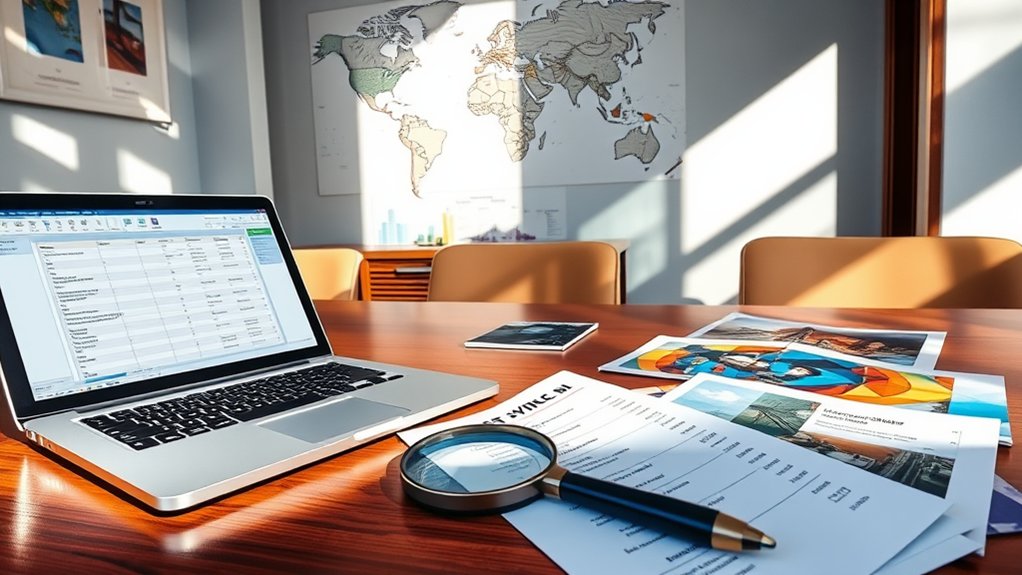
When hiring an international mover, it's important to dig into the details of their fees and additional charges. Understanding the pricing structure is vital for getting an accurate quote. Ask how they calculate costs based on factors like weight, volume, and distance. These elements can greatly impact the final price.
Request a detailed breakdown of all potential fees. This includes additional charges for services such as packing, storage, customs clearance, and fuel surcharges. Knowing these details helps you avoid unexpected expenses. It's also wise to confirm whether they offer binding estimates. Binding estimates lock in the quoted price, while non-binding estimates can lead to fluctuating costs on moving day.
Don't forget to ask about hidden fees that could arise during the moving process. Charges for extra stops, stair fees, or fees for packing materials can quickly add up. Ensuring complete transparency will help you budget correctly.
Lastly, clarify the payment terms. Ask about deposit requirements and accepted payment methods. Understanding these financial aspects will prepare you for the costs associated with your international move. By asking these questions, you can navigate the fees and additional charges more effectively, ensuring there are no surprises along the way. Being informed allows you to make a better decision and choose a mover that aligns with your budget and needs.
Delivery Procedures and Timelines
When hiring an international mover, it's essential to confirm the estimated delivery schedule. Ask about their unpacking and setup assistance, as well as how they handle any delays that might occur. Understanding these delivery procedures will help you plan effectively for your move.
Delivery Schedule Confirmation
How can you guarantee a smooth delivery schedule for your international move? Start by confirming the estimated delivery timeframe with your moving company. Transit times can vary from 1 to 6 weeks based on your destination and chosen shipping method. It's also essential to inquire about their policy on guaranteed delivery dates. Some movers offer written commitments, while others may not be liable for late deliveries.
Here are a few key points to reflect on:
- Clarify factors that could cause delays, like customs clearance processes or weather conditions.
- Understand the communication protocols the mover has in place. You should receive timely updates about your shipment's status and any potential delays.
- Ask about the procedures for scheduling delivery upon arrival. Know if you need to be present during unloading and what the delivery windows will be.
Unpacking and Setup Assistance
Are you prepared for the unpacking and setup process once your belongings arrive? Before hiring an international mover, confirm whether unpacking services are included in your quote. Some companies may charge extra for this assistance, so it's important to clarify this upfront. Inquire about the timeline for unpacking and setup. Knowing how quickly you can access your belongings helps you plan your first days in your new home.
Ask if the movers will assist with arranging furniture and setting up appliances. This service can ease your change considerably. Additionally, clarify the procedures for disposing of packing materials after unpacking. Some movers may remove waste for you, while others expect you to handle it yourself.
Understanding the communication protocols for confirming delivery times is vital. This will help you manage expectations regarding unpacking and setup. By asking these questions, you'll have a clear picture of the services provided and can prepare accordingly. Make sure you're on the same page with your mover to guarantee a smooth unpacking experience. Having this information will allow you to settle in comfortably and quickly.
Handling Delayed Deliveries
What happens if your delivery gets delayed? It's important to know how your international mover will handle these situations. Start by asking about their specific procedures for managing delayed deliveries. Understanding their communication methods and the frequency of updates is vital. You want to be informed promptly if issues arise during shipping.
Consider these key points:
- Estimated Timeframes: Inquire about how long delays typically last and what factors, like customs clearance or transportation logistics, can influence this.
- Delivery Guarantees: Confirm if the company offers guarantees on delivery dates and how they address significant delays.
- Compensation Policies: Ask about their compensation policies for delays to know what you can expect in case of issues.
Evaluating the mover's experience with common causes of delays, like weather disruptions or port congestion, will give you an idea of their preparedness. By understanding these aspects, you can choose a mover that keeps you informed and ready for any potential delays in your delivery.
Special Services for Unique Items

When reflecting on an international mover, have you thought about the special services they offer for unique items? It's vital to ask if the moving company provides specialized packing and crating services for fragile items. High-quality materials can minimize damage during transit, especially for delicate possessions.
You should also check if the mover has experience handling unique items like pianos, artwork, or antiques. These items require specific expertise and careful handling to guarantee they arrive safely at your new location. Additionally, confirm whether the company offers climate-controlled storage options. Sensitive items might be adversely affected by temperature fluctuations, so having a suitable storage solution is significant.
Insurance options are another important aspect to assess. You'll want to ask about coverage specifically for high-value or unique items. This guarantees that you have adequate protection in case of loss or damage during the move.
Furthermore, verify if the mover can accommodate additional services. If you have a vehicle that needs transport or pets that need relocation, these may require specialized handling and logistics.
Post-Move Support and Assistance
How can you guarantee a smooth changeover into your new home after the move? Post-move support is essential for a seamless shift. Before you hire an international mover, it's important to ask about the assistance they offer after your belongings arrive. Consider the following points:
- Unpacking Services: Check if they provide unpacking services. This can help you set up your new home quickly and efficiently.
- Disposal of Packing Materials: Inquire whether the company disposes of packing materials after the move. This can simplify your shift and reduce clutter in your space.
- Customer Support: Confirm if there's dedicated customer support available after your move. Knowing you can reach out for help with any issues can provide peace of mind.
Additionally, ask about any follow-up services they offer to guarantee your satisfaction. This includes addressing potential claims for damaged or missing items. It's also beneficial to see if they provide resources or guides for settling into the new location. These can include information about local services, schools, and community resources.
Frequently Asked Questions
What Questions Should I Ask Movers?
When you're exploring movers, ask about their moving services, international logistics expertise, and shipping options. You'll want clarity on customs regulations too, ensuring your belongings arrive smoothly and without unexpected complications.
How Do I Choose an International Mover?
Choosing an international mover is like steering through a maze; you need clarity. Start with international moving tips, compare shipping options, guarantee moving insurance covers your belongings, and focus on choosing reliable movers with strong reputations.
What to Know Before Using a Moving Company?
Before using a moving company, understand moving logistics, check insurance options, and learn about customs regulations. Also, ask for packing tips to guarantee a smooth process and safeguard your belongings during transit.
What Is the Average Cost of an International Move?
International moving costs can range from $2,000 to $20,000, depending on shipping container prices, customs fees, and insurance options. It's essential to compare quotes to avoid unexpected expenses and get the best deal.
Conclusion
Choosing the right international mover is like picking a reliable travel guide for a new country. You want to guarantee they have experience and clear pricing. Ask about their services, packing methods, and delivery timelines. Understanding these details helps you avoid surprises later. Consider their support after the move, too. By asking the right questions, you can make a confident choice and guarantee your move goes smoothly.
Related posts
Recent posts
Post Categories
Tags
Subscribe


